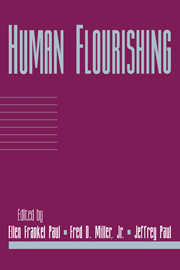Book contents
- Frontmatter
- Contents
- Introduction
- Acknowledgments
- Contributors
- Human Flourishing and the Appeal to Human Nature
- The Three Faces of Flourishing
- Flourishing Egoism
- The Idea of a Life Plan
- Human Flourishing Versus Desire Satisfaction
- Happiness and Human Flourishing in Kant's Ethics
- Valuing Activity
- Ancient Perfectionism and Its Modern Critics
- Aristotle's Elusive Summum Bonum
- Eudaimonism, Love and Friendship, and Political Community
- No Families, No Freedom: Human Flourishing in a Free Society
- Politics, Neutrality, and the Good
- Human Flourishing and Universal Justice
- Index
Flourishing Egoism
Published online by Cambridge University Press: 05 October 2013
- Frontmatter
- Contents
- Introduction
- Acknowledgments
- Contributors
- Human Flourishing and the Appeal to Human Nature
- The Three Faces of Flourishing
- Flourishing Egoism
- The Idea of a Life Plan
- Human Flourishing Versus Desire Satisfaction
- Happiness and Human Flourishing in Kant's Ethics
- Valuing Activity
- Ancient Perfectionism and Its Modern Critics
- Aristotle's Elusive Summum Bonum
- Eudaimonism, Love and Friendship, and Political Community
- No Families, No Freedom: Human Flourishing in a Free Society
- Politics, Neutrality, and the Good
- Human Flourishing and Universal Justice
- Index
Summary
VIRTUE AND SELF-INTEREST
Early in Peter Abelard's Dialogue between a Philosopher, a Jew, and a Christian, the philosopher (that is, the ancient Greek) and the Christian easily come to agreement about what the point of ethics is: “[T]he culmination of true ethics … is gathered together in this: that it reveal where the ultimate good is and by what road we are to arrive there.” They also agree that, since the enjoyment of this ultimate good “comprises true blessedness,” ethics “far surpasses other teachings in both usefulness and worthiness.” As Abelard understood them, both fundamental elements of his twelfth-century ethical culture—Greek philosophy and Christian religion—held a common view of the nature of ethical inquiry, one that was so obvious to them that his characters do not even state it in a fully explicit way. They take for granted, as we take the ground we stand on, the premise that the most important function of ethical theory is to tell you what sort of life is most desirable, or most worth living. That is, the point of ethics is that it is good for you, that it serves your self-interest.
This idea sounds very strange to modern ears, and is scarcely made less so when it is stated, as it is by Abelard, in terms of the concept of happiness or, to use the somewhat broader term that is now widely used, of “flourishing.” It still sounds as if things are being combined that cannot be put together.
- Type
- Chapter
- Information
- Human Flourishing , pp. 72 - 95Publisher: Cambridge University PressPrint publication year: 1999



